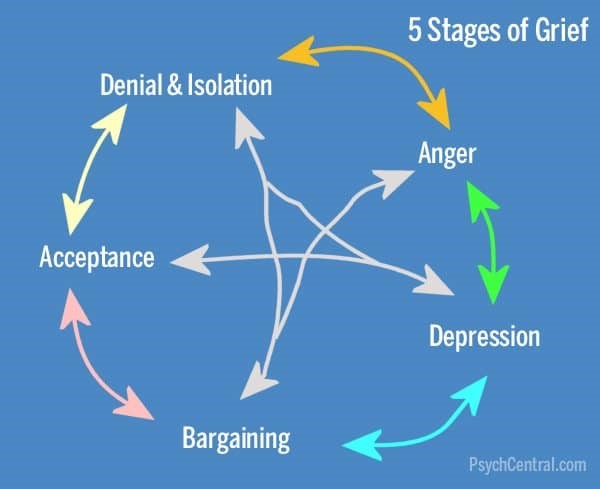Grief and Loss

Talking about grief and loss is never easy. Experiencing it can be even harder. There are many situations that cause grief including the loss of another person, a relationship, jobs, homes, substance use, daily routines, drastic life changes, such as a terminal illness, and many other life experiences. When these people and things are taken away from us, it leaves us with unsettling feelings that can be a struggle to manage. This pandemic has shed light on grief and loss in new more community wide way, as many of us have experienced unexpected changes or the loss of someone.
Elizabeth Kübler-Ross developed a model based off of terminally ill patients that she worked with called the “Stages of Grief”. Stages of Grief is a 5-stage model that helps put perspective on the strong emotions and battle one may experience after a loss. Those who go through the Stages of Grief can spend different lengths of time working through each stage and different levels of intensity. The five stages are below:
| Stage | Common thoughts: | Responses: |
| Denial | “This can’t be happening”
“I don’t believe it” “Life does not make sense” “How will life go on” “This can’t be happening” |
This stage typically includes avoidance, shock, fear, confusion, numbness, and disbelief. Shock is a natural defense mechanism when we experience too much pain at one time. Denial helps in staging out our grief. Rather than full blown emotional responses right away, when we deny or don’t accept our loss, the full impact of the loss is staggered out. |
| Anger | “Why is this happening”
“Life is not fair” “Its all your fault” |
In this stage we want to place blame on someone or something for our loss. We are upset and looking for a reason behind the loss. We may argue that this situation is not fair. In denial, we are numbed out of the initial strong emotions. In the anger stage, these emotions can come out and be aimed at loved ones, strangers, objects, or the individual who has been lost. |
| Bargaining | “I will do anything to have them/it back”
“I am willing to do anything to change this” “What if…” “I would give my life if it will bring them back” |
In this stage we may be feeling guilty. If only I had sought out care sooner or if I had done something different maybe they would still be here with me. We may try to develop ideas of how to change the loss. During this stage we are delaying our loss. |
| Depression | “I cant feel anything anymore”
“What’s the point” “I don’t care about anything” “The pain is too much” |
In this stage we may feel the need for increased sleep, have a lack of energy, lose motivation. We come to recognize our loss has/is occurring. We can feel empty and want to withdraw from others. The world can seem like too much during this time. |
| Acceptance | “I am going to be ok”
“I can accept this” “I can still live my life” “I am at peace with what happened” |
In acceptance, we have come to terms with the loss. This is usually the last stage experienced, although not always. In this stage we have come to understand the situation logically and emotionally. There will still be painful days, but we are able to move forward in life with a positive outlook. |

It’s important to note that grief is not a linear process, but rather like riding a wave or roller coaster. Every person handles grief differently, although they may be processing the same loss. Some people may go through all five of the stages identified above, some maybe two or three. We often move through these stages before we are able to achieve a peaceful acceptance of our loss. There is no right or wrong way to deal with a loss and no one will truly understand all of what you are experiencing. The best thing to do is to allow yourself to feel the grief as it comes to you. If we resist it can prolong the healing process. It is a difficult journey, but having support and moving through the stages, and giving yourself the acceptance and space will help. Always seek out help from family, friends, and professionals. There is support available to you. To end this week’s blog, I would like to leave you with tips on how to cope with loss
- Don’t try and suppress your feelings. Allow yourself to “ride the wave” and feel
- Don’t let anyone else tell you how you should feel
- Express your feelings to others. It’s important to have support
- Express yourself in ways that help you. Creativity can be helpful, such as writing and painting
- Plan ahead for grief triggers, such as holidays and anniversaries. Ask your family for additional support when you know these days are coming
- Draw comfort from your faith
- Join a support group
- Continue to engage in your hobbies and interests
- Take care of yourself physically
Written by: Meaghan Warner, LCSW-S